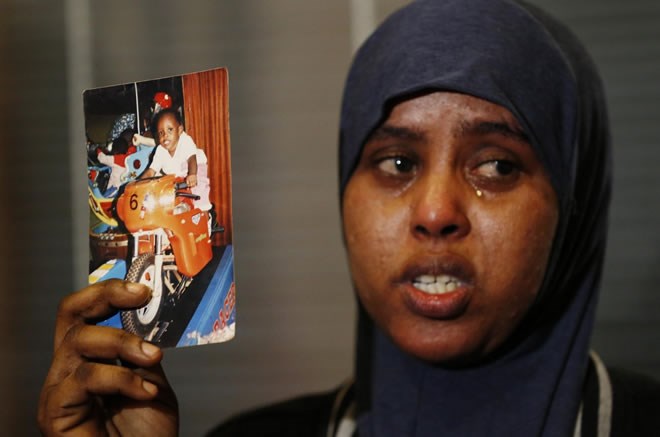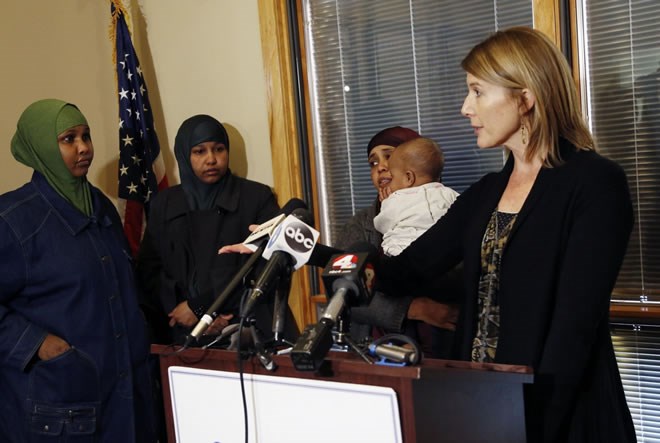Immigrants separated from families urge Trump to reconsider Muslim ban

Friday, January 27, 2017

Fatuma Isaac holds a photo of her daughter Sihaam Cabdiraxman, who is now 12 years old and living in Uganda, while talking about their separation during a press conference to discuss the concerns about President Trump's possible ban on refugees from Muslim nations at the Council on American-Islamic Relations office in Dublin on Jan. 26, 2017. Isaac hasn't seen her daughter since 2006. (Adam Cairns / The Columbus Dispatch)
As President Donald Trump contemplates signing an executive order to halt admission of refugees from seven countries, local Somali mothers are crying out for help.
"I'm requesting our new president to assist us, to help us bring our family, my mom and my daughter. They're helpless," begged Fatuma Isaac, through a translator, at the Council on American-Islamic Relations Ohio headquarters in Dublin.
Isaac was there with four other Muslim women who fled to America for safety from Somalia.
Each of the women, just a few of the estimated 15,000 to 40,000 Somali immigrants and refugees living in Columbus, took their turns speaking out, often through tears, to ask Trump for help in reuniting their families.
The president may sign a month-long halt to any immigrants coming into the country from seven countries with large Muslim populations: Syria, Iran, Iraq, Libya, Yemen, Sudan and Somalia. In addition, no refugees would be allowed into the country for 120 days, as the administration looks at screening processes.
The women were joined by representatives of CAIR, the American Civil Liberties Union, Community Refugee and Immigration Services, US Together, the Abubakar Assidiq Islamic Center on the West Side, Noor Islamic Cultural Center on the Northwest Side, and World Relief Columbus.
Some described Trump's actions as "fear-mongering."
"He's capitalizing on the belief of large groups of people that think all Muslims are terrorists," said Jennifer Nimer, CAIR Ohio director. "They're doctors, lawyers, teachers ... they're not the criminals or terrorists people are making them out to be."
Isaac speaks Somali. She lives in Columbus and is afraid that her 12-year-old daughter and sick mother won't be able to come to America if Trump goes through with the order. They fled Somalia and are living in Uganda. She hasn't seen her daughter, Sihaam Cabdiraxman, since 2006.
"My daughter calls me all the time and when I hear her voice, I cry out," Isaac said.
Isaac has tried for years to get her mother and daughter to the United States. She, like the others who spoke, followed all the immigration rules, filling out endless stacks of paper and having their relatives go through countless tests, to now find out they may never get their families to safety.
"We dangled that hope in front of them and now we're going to shut the door on this," said Angela Plummer, executive director with Community Refugee and Immigration Services, which places refugees in welcoming Columbus neighborhoods. "It's so inhumane, this is not our values ... destroying families and people who have followed the rules. This country has always been a beacon of hope."
Amina Ibrahim, 36, of Northeast Columbus, wiped her eyes with her hijab as she spoke at the CAIR gathering of her son, Mohammed Bare, 4, who is in Uganda. She was holding her 4-month-old son, Mushtaq Billow, with her 3-year-old daughter, Mumtaz Billow, at her feet.
"We want to see each other again in Columbus," she said.
The two were separated when she was forced to flee her home country of Somalia because of fear of persecution, after a militant group killed her brother and father. She came to America in May 2015, and that was the last time she saw her son.
Now, she contemplates going to Uganda with her children to find him, but it isn't safe.
More refugees are scheduled to fly into the United States in February, but Plummer isn't sure they'll be able to get into the country. Attorneys are mobilizing at airports to help, if necessary. Plummer urged people to call their legislators and keep protesting.

Angie Plummer, executive director for Community Refugee & Immigration Services, speaks during a press conference to discuss the concerns about President Trump's possible ban on refugees from Muslim nations at the Council on American-Islamic Relations office in Dublin on Jan. 26, 2017. (Adam Cairns / The Columbus Dispatch)
CRIS and CAIR didn't mobilize before because "it seemed so unfathomable that we would dismantle the 40-year refugee program, this humanitarian program that has bipartisan support and community-wide support," Plummer said.
To people's claims that the executive order is for safety and national security, Plummer points to the mothers and the families who want to be whole again.
"They've left behind unimaginable terror and fled terrorism and come to restart their lives," she said.
In addition, there is no data to show that refugees are terrorists, Nimer said.
"To have this done under the guise of national security, it's just not true. It doesn't do anything to make anybody safer, it seems that's not the real intention here," Nimer said.
Ubah Egal's four children, in a refugee camp in Uganda, have asked her if she's forgotten about them. Instead, she worries about them all the time, trying to get them to United States and safety with her and her other four children who live with her. She works a full-time job to support her children, and sends money to those living in Uganda.
"Our family cannot go back to Somalia at this time because there is no secure national government," Egal said. "We have this problem. We need help from our new president and government."
"Sometimes I'm laughing," she said. "But it's only with my mouth and my eyes. Not my
